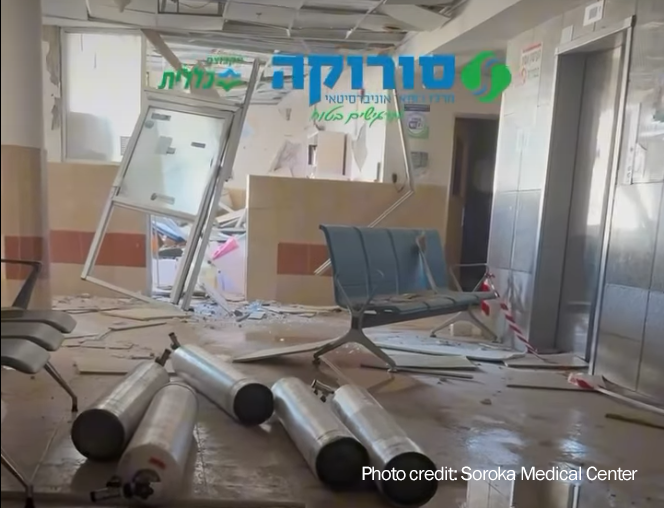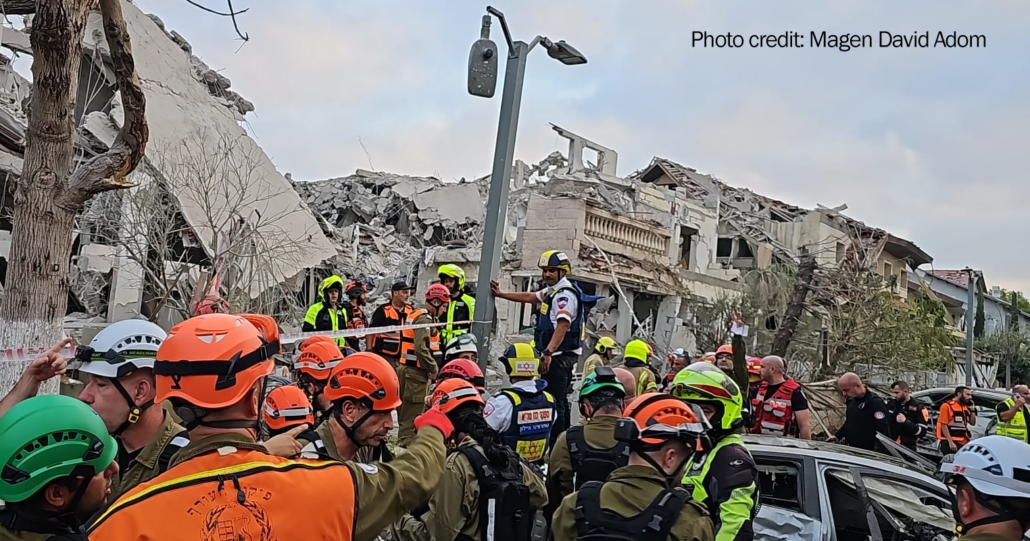June 20, 2025 | 24 Sivan, 5785
After 623 days of grief and war, our partners on the ground in Israel describe the current state of emergency as a haunting blend of the COVID era and the post–October 7th crisis with solidarity and acts of kindness alongside fear and isolation. Civil society is stepping up, with people of all walks of life meeting rapidly changing needs.
Grassroots civil society is organizing – neighbors are helping the elderly and those with disabilities reach safe rooms, creating impromptu games to comfort children in parking garages-turned-shelters, and offering housing to those evacuated from their homes or stranded in Israel. Doctors and medics are racing to missile impact sites, working around the clock in perilous conditions. Search-and-rescue teams are combing through rubble for signs of life. Broader communities are gathering with hostage families on Zoom to remind them they are not alone.
While the Israeli spirit is incredibly resilient, people are exhausted and unsure of what lies ahead. As one friend shared, “It’s both breathtaking and heartbreaking to witness the prowess of what Israel is accomplishing while mourning lives lost and the daily rhythm of normal life that feels ever disrupted.”
“Mi k’amcha Yisrael?”—Who is like Your nation, Israel? These ancient words resonate today, as Israelis from all sectors demonstrate courage, compassion, and solidarity.
Below, you’ll find urgent needs as reported by our team and trusted partners on the ground. As we did after October 7th, we’ll continue sharing needs as they develop. Please consider supporting the Israel Emergency Grassroots Response Initiative, the Jewish Federation of San Diego Israel Emergency Campaign, or any Israeli organizations close to your heart. Reach out to family, friends, and others you know in Israel. Your support really matters.
If you’d like guidance on where or how to give, or just want to connect to what’s happening on the ground, please reach out.
- Hospitals and First Responders: Many hospitals around the country have moved their care centers underground. There’s renewed concern for health care facilities after the direct hit on the Soroka Medical Center in Beersheva. They will need assistance to rebuild. Thankfully patients had just been moved to a safer space, or the toll would have been far worse. Resources are needed for these shifts and for acute care, trauma treatment, and rehabilitation. Frontline medics and rescue teams racing to the scene need fuel, protective equipment, and trauma support.
- Evacuees: Thousands of families have been evacuated from their destroyed homes and are now in hotels or short-term accommodations. Anxiety about what comes next is rising. They need help with basic supplies, emotional-educational support, as well as small perks that improve their daily lives.
- Shelter Infrastructure: Thirty percent of Israelis (2.6 million people) don’t have access to approved shelters and 60% don’t have safe rooms in their homes or apartments. Only certain kinds of mobile shelters are effective against ballistic missiles. Neighborhood groups and public spaces, like public gardens and zoos, are working quickly to install more suitable shelters for safety and some sense of respite.
- IDF Reservist Families: Thousands of families are already under great strain after being in and out of army service for hundreds of days, including single parent families. This impacts small businesses and freelancers particularly hard and has ramifications for the entire economy. Around 100,000 are currently in reserve duty and their families need strong support systems.
- People with Disabilities and Seniors: It’s essential to activate quick improvements to help those with disabilities, enhance communication systems for the hard of hearing and others, and improve access to shelters.
- Frameworks for Children: Schools and camps have been canceled and parents need options for care and respite. Activities for those whose schools and camps have been cancelled and respite for parents. After experiencing many months of conflict and disruptions to their routines, children are suffering higher rates of anxiety, depression, and stress. They have special requirements for support, play, and learning.
- Mental Health: Critically needed services for the many Israelis experiencing long-term trauma and loss. Mental health professionals treating their patients’ trauma, while carrying their own, need extra care for compassion fatigue. Healthcare workers need particular support.
- Bring Them Home: As Israel navigates this new phase of trauma, impact, and war, the hostage families are in deeper angst and pain as they perceive priorities being shifted from their loved ones, held in Gaza for 623 excruciating days. Advocacy and support efforts continue to be essential.
We will continue to keep you informed as needs progress.
Support these needs by giving to the
Israel Emergency Grassroots Response Initiative*
We are also proud to support the Jewish Federation of San Diego Israel Emergency Campaign
Due to the widening of the conflict and growing civilian needs, Jewish Federation of San Diego has reopened its Israel Emergency Campaign. Directly support the emergency needs of Israelis, including San Diego’s partners in Sha’ar HaNegev, through the emergency campaign.
* Fund held at Jewish Community Foundation.
The Jewish Community Foundation San Diego and Leichtag Foundation’s philanthropy team – Impact Cubed – are reuniting. Effective August 1, we will integrate our philanthropic advisory services, educational offerings, nonprofit capacity building efforts, and commitment to supporting strong Jewish and civic organizations. Learn more here.



